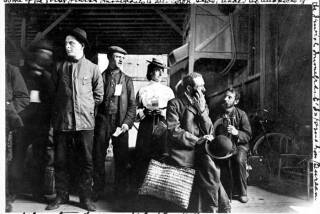The Dialectic of Devotion
- Share via
By the age of 21, Allegra Goodman was exploring the paradoxes of contemporary Judaism and family life with wit, irony and complexity. Raised in Hawaii and bat mitzvahed in a muumuu, she skipped what she calls “the classic Jewish neurotic New York experience.” Her writing is informed by her academic background and her Conservative Jewish one: She is the daughter of two professors and the wife of another, and she has a doctorate in English. Now, at 30, she is following her two wry, enthusiastically received collections of stories, “Total Immersion” and “The Family Markowitz,” with an accomplished first novel.
“Kaaterskill Falls” is a richly textured portrait of a small community in the Catskill Mountains of upstate New York. The town is populated in summer by separatist Orthodox followers of Rav Elijah Kirshner from Washington Heights and by other Jewish groups from Brooklyn, who settle among year-round locals, most of whom are not Jewish. Goodman impressively weaves together narratives about a variety of characters who reside cheek by jowl in this closely knit community. Some, like Elizabeth Shulman, who has five daughters but longs for an occupation that will fulfill her, are devoutly observant. Others, such as irreverent English mathematician Beatrix Kahan and her husband, Cecil Birnbaum, a Shavian scholar who first appeared in “Total Immersion,” are openly questioning. As in Goodman’s short stories, the resulting picture displays a spectrum of how one can live and find meaning in life.
But whereas Goodman’s stories are suffused with wit and warmth, the mood is a shade darker and more serious in “Kaaterskill Falls.” The themes of generational conflict and levels of religious observance still absorb Goodman. In addition, she has expanded her focus to include the subject of inheritance. She raises penetrating questions about the links between inheritance and continuity and about whether “places and things, or even ideas, can be transmitted over time.” Can the Kirshners survive the passing of their “scholar, judge, historian, witness”? Who will the Rav choose to take his place as the spiritual leader of his flock? And can the charm of Kaaterskill Falls survive the aggressive real estate development planned by longtime resident Michael King, ne Klein? Will anti-Semitic Judge Miles Taylor succeed in stopping the developer with a dirty secret from King’s wild youth?
When the novel opens in 1976, Rav Kirshner, a frail and ailing but still controlling 78, has yet to choose a successor. He is a man of great learning, neither a Hasid nor a mystic but “a rationalist, interested in law, not myth.” He has two sons between whom he must choose: Jeremy, a Queens College professor who is brilliant and undeniably more interesting, but defiantly unmarried and worldly, and Isaiah, equally indoctrinated but not as intelligent as Jeremy. With his bitterly efficient wife, Rachel, Isaiah attends his father’s every need loyally and ploddingly.
Not since Chaim Potok’s “The Chosen” have readers been treated to such an intimate look at a closed Orthodox community. Goodman’s portrait of the Rav is a marvel of research and imagination, a fascinating, multifaceted profile of power and rigidity based on utter devotion to Jewish law and prayer. The Rav’s existence has been “a life of increasing restrictions.” It is “bounded and punctilious” and, to the outsider’s eye, has more to do with obedience than with sacredness. His followers must not only keep kosher homes but also must purchase all their food from the few purveyors approved by the Rav. They pray by rote, on schedule. The women sit separately from the men in shul and, once married, cover their hair with scarves or wigs called sheitels. (Goodman provided a glossary in her first book of stories but, not unreasonably, counts on the reader to glean the meaning of words such as drash, shiur and onegs from context in her novel.)
Skeptics might bristle at the Rav’s tyranny and shudder at his power over his followers. Goodman masterfully evokes the frustrations of those who come up against his inflexibility. Elizabeth, eager to start a small business providing kosher groceries to the summer residents, can do nothing without the Rav’s seal of approval. In one of the more dramatic scenes of the book, Jeremy incurs his father’s wrath by arriving late for Sabbath candle-lighting.
In a lesser writer’s hands, this material might yield a fairly predictable book about the rub between restrictive traditions and freedom, with the confined finally breaking free. Elizabeth might chafe to the point of total revolution, proceeding with her grocery store without the Rav’s sanction. Or Renee Melish, the unhappy adolescent caught between her overly strict mother and her much older, doubting Budapest-born father, might rebel by running off with her radical Syrian friend.
But Goodman is much subtler than that--and indeed, much subtler than Potok on intergenerational conflict. Her characters may want to examine and even touch the secular world, but they never consider casting off their religious identity. In prose that is assuredly descriptive, Goodman reveals how devotion shapes and defines these people. It is a tribute to her skill that she is able to make even readers impatient with such obedience recognize her characters as fortunate for their ability to separate “the holy from the profane . . . the transcendent moment from the workaday world.” As always, Goodman finds what there is to respect and even envy in these people. “Kaaterskill Falls” is a different, surprising kind of Jewish novel for those weaned on Philip Roth and “the classic Jewish neurotic New York experience”--one that isn’t afraid to both question and embrace Yiddishkeit and spirituality.
More to Read
Sign up for our Book Club newsletter
Get the latest news, events and more from the Los Angeles Times Book Club, and help us get L.A. reading and talking.
You may occasionally receive promotional content from the Los Angeles Times.










